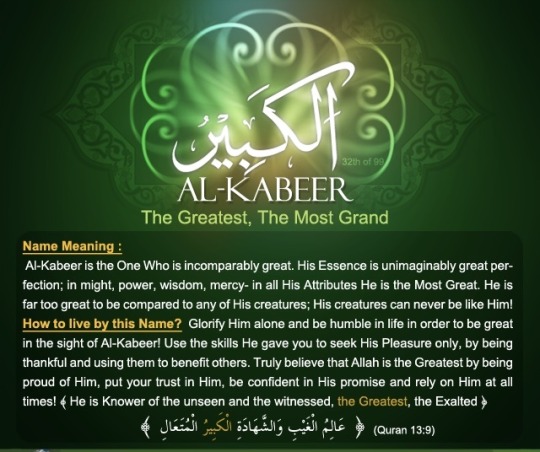Text
Hi 🎶 Sunwaver! Join my team on Sunwaves and receive 10 SW coins when you sign-up using my referral code: https://sunwavestoken.com/@sherrykhalil
ابھی جوائن کریں۔ Sunwave Token🔥
پیسہ خود چل کر اپ کے پاس آرہا ہے۔ کرپٹو کی ہسٹری کے بڑے پروجیکٹس میں سے ایک پروجیکٹ ہے۔
ابھی جوائن کریں۔ Sunwave Token🔥
2 notes
·
View notes
Text
Hi 🎶 Sunwaver! Join my team on Sunwaves and receive 10 SW coins when you sign-up using my referral code: https://sunwavestoken.com/@sherrykhalil
ابھی جوائن کریں۔ Sunwave Token🔥
پیسہ خود چل کر اپ کے پاس آرہا ہے۔ کرپٹو کی ہسٹری کے بڑے پروجیکٹس میں سے ایک پروجیکٹ ہے۔
ابھی جوائن کریں۔ Sunwave Token🔥
2 notes
·
View notes
Text

Allah calls Himself Al-Muqeet— The All-Sustainer, The All-Nourisher, The All-Preserver— on one occasion in the Quran. He is the powerful maintainer who sustains, nourishes, protects, and oversees all that exists. Al-Muqeet is taking care of all living beings by sending down all kinds of physical and spiritual nourishment for them!
The Ultimate Maintainer, Nourishing and Overseeing Creation
Muqeet come from the root qaaf-waw-taa, which carries four main meanings. The first meaning is to supply, maintain, and sustain. The second main meaning of this root is to feed and nourish. The third is to keep, preserve, and guard, and the fourth is to witness, observe, and watch over.
This root appears twice in the Quran in two derived forms. Examples of these forms are aqwātahā (its sustenance) and muqeetan (a keeper).
Linguistically, muqeet refers to the attribute of sustaining. Al-Muqeet sustains bodies and the souls and He has taken it upon Himself to sustain His creation. As He creates all things, Al-Muqeet also creates what sustains them; He makes accessible what is necessary and what is luxury. He gives us what we need to survive, until He wills to put an end to life— then He simply withholds what keeps us alive. Al-Muqeet alone is capable and knowledgeable of everything.
Al-Muqeet Himself says: . . . And ever is Allah , over all things, a Keeper [Quran, 4:85].
Sustaining Body and Soul
Al-Muqeet protects and sustains living beings; in this sense this name is strongly related to Al-Hafeedh, The Preserver. He does not only sustain our bodies with provisions like food and drink, but Al-Muqeet also for example sustains the heart through knowledge. Sustaining us is even more specific than the attribute of providing for us, Ar-Razzaaq.
Al-Muqeet and Al-Mugheeth
Some reports give the name al-Mugheeth instead of al-Muqeet. Al-Mugheeth is interpreted as meaning the Helper, for He helps His slaves at times of difficulty when they call upon Him; He answers them and saves them. It also has the meaning of the One Who responds and the One Who is called upon. Ighaathah [help] refers to actions and istijaabah [responding] refers to words, but they may be used interchangeably. Ibn al-Qayyim said: He is the Helper of all His creatures, and He responds to those who are desperate [Sharh Asmaa’ Allaah ta’aala al-Husna by Dr. Hissah al-Sagheer]
How Can We Live By This name?
1. Make abundant dua to Al-Muqeet.
Al-Muqeet hears the silent dua and responds to it and knows your affliction and is the only One Who removes it. Call upon Al-Muqeet, using this beautiful name, to ask to sustain your body with provisions and your heart with the knowledge of Islam.
2. Recognize Al-Muqeet in every sustenance.
Let this name inspire you to equip yourself with this good manner: every time food is brought to you, recognize Al-Muqeet and His amazing grace through which you are provided with food. This goes for all the daily life provisions you never really think about, even the knowledge you are able to gain to strengthen your mind and heart. If you train yourself to such recognition you will be able to live by this name.
3. Sustain others with the help of Al-Muqeet.
If you are grateful to Al-Muqeet for His sustenance, protection and nourishment He will make you treasure-house for His servants, enabling you to sustain others, teach them knowledge, and lead them to the ever-Living, the Sustainer.
4. Seek your wishes from Al-Muqeet only.
Only seek the fulfilment of all your wishes and desires from Him, for only Al-Muqeet holds the keys to the treasures of His sustenance. Al-Muqeet said in a hadith qudsi to Musa ‘alayhi sallam: O Musa! Ask Me with regard to everything, including your shoe strings and the salt for your pot.
5. Rely on Al-Muqeet.
He can sustain and look after the whole creation without ever getting tired, so be sure Al-Muqeet looks after you in the best possible way. Rely on Him to provide for you, nourish you and protect you by never seeking haram means of sustenance or doubting in His power to maintain you.
6. Nourish your soul by faith in Al-Muqeet.
Nourish your heart by having faith in His Oneness and nourish your soul by the five pillars of Islam; shahadah, prayer, zakat, fasting and Hajj.
7. Use your sustenance in the right way.
Whatever Al-Muqeet blessed you with, protected you with and gave you access to, show Him that you use it to please Him and not to anger Him. Pay your zakah over your belongings, give abundant sadaqah with your time and skills and don’t misuse your sustenance by using it for inpermissable things or by being ungrateful or unsatisfied.
O Allah, Al-Muqeet, we know that You are the only One able to maintain all there ever was, is and will be. Sustain our bodies and souls , make us recognize Your sustenance and guide us to be of those who use their sustenance to gain Your Pleasure and become a way of sustenance for others, teaching others and leading them to You. Bless us with reliance on You and make us seek You only for everything we want or need, ameen!
12 notes
·
View notes
Text
مجھ کو بھی ترکیب سِکھا ، کوئی یار جَولاہے
اکثر تُجھ کو دیکھا ہے کہ تانا بُنتے
جب کوئی دھاگہ ٹُوٹ گیا ، یا ختم ہوا
پھر سے باندھ کے ، اور سِرا کوئی جوڑ کے اُس میں
آگے بُننے لگتے ہو.
تیرے اِس تانے میں ، لیکن
ایک بھی گانٹھ گرہ بُنتر کی
دیکھ نہیں سکتا ہے کوئی
میں نے تو ایک بار بُنا تھا ، ایک ہی رِشتہ
لیکن اُس کی ساری گرہیں
صاف نظر آتی ہیں ، میرے یار جولاہے.
مجھ کو بھی ترکیب سِکھا ، کوئی یار جولاہے.
گُلزار
3 notes
·
View notes
Text
writers can relate with me that they can only write a lot better on things they had a first hand experience of so, one can tell how beautifully Allah taala The Greatest of all has written down the Quran, full of beautiful messages, He s.w.t introduced us to what He wanted us to know, kept a lot to Himself but still gave us the description of His world, for now im thinking about Surah Shams and of His world He has created me a part of Alhamdulillah May He continues to make us all a part of everything that is pure and beautiful to Him, Ameen!
4 notes
·
View notes
Text

Allah calls Himself Al-Kabeer— The All Great, The Most Great, The Grand— on six occasions in the Quran. He is the One who is unimaginably great and perfect. Al-Kabeer embraces all kinds of greatness, from rank, size, nobility, and knowledge to mercy, and it tells us that nothing was, is, or will ever be like Him!
The All-Great, the One Far Greater Than Anything or Anyone
Kabeer comes from the root kaaf-baa-raa, which points to three main meanings. The first is to be great in rank and nobility and the second to be great in size. The third main meaning is to be great in age and the fourth to be great in learning and knowledge. The fifth main meaning is to have rights above all others.
This root appears 161 times in the Quran in eighteen derived forms. Examples of these forms are kabura (“is great,” or “is difficult”), fakabbir (“magnify”), mutakabbireen (“the arrogant)”, akbaru (“greater”), kibaru (“old age”), and kubra, kabeer (“great”).
Linguistically, kibriyyah refers to the concept of greatness. One who is kabeer is someone great in rank or skill. Allah is Al-Kabeer—The All-Great and The Most Great; for each of His attributes He is the greatest.
Al-Kabeer Himself says: So the judgment is with Allah, the Most High, the Grand [Quran, 40:12], . . . because Allah is the Most High, the Grand [Quran, 22:62], and . . . Indeed, Allah is ever Exalted and Grand [Quran, 4:34].
The Ranks of This World and the Hereafter
We’re naturally predisposed to admire those who are most beautiful, most intelligent, most eloquent, most powerful, most generous, most merciful, etcetera.
However Al-Kabeer Himself says: See how We prefer one above another (in this world), and verily, the Hereafter will be greater in degrees and greater in preferment [Quran, 17:21]. The poorest in this world can be the richest in the Hereafter; it all depends on one thing: your rank with Allah al-Kabeer.
How Can We Live By This Name?
1. Say a lot of takbeer.
Revive the sunnah of The Prophet ‘salallahu ‘alayhi wa sallam by saying a lot of takbeer— Allahu Akbar. Abdullah ibn ‘Umar narrates that a man came late to Salāh. Upon arriving to the line he started his prayer with the following words, Allāhu Akbaru Kabīran wal-hamdulillahi kathīran wa subhān Allahi bukratan wa asīlā. The Prophet, after completing the prayer, asked the people who had said this. The man said, O Rasūlullah, I did not intend by it other than good. The Prophet salallahu ‘alayhi wa sallam said, I saw the gates of heaven open because of those words. Ibn ‘Umar added, I never ceased saying these words since hearing the Prophet say that. [Muslim, At-Tirmidhee, An-Nasaa’i and Ahmad]
2. Find happiness with Al-Kabeer.
Your original nature makes you seek love and perfection and Allah Al-Kabeer is the source of all perfection. So only by turning to Him can your heart feel peace and happiness. In fact, the more you get to know about Him, His names and His attributes, the more you’ll turn to Him with true love and devotion and feel secure and peaceful with Him.
3. Magnify Al-Kabeer in the proper way.
Allah ‘azza wa jall instructs you: And magnify Your Lord [Quran, 74:3]. Words to magnify Al-Kabeer, like the tahleel (laa ilaaha illAllah) tahmeed (Alhamdulillah), tasbeeh (subhanAllah) and takbeer (Allahu akbar), have great meanings; ponder their true meanings, increase in saying them and be careful not to misuse them.
4. Seek perfection at the source.
Don’t disappoint yourself by expecting others to be perfect and admiring those with wealth or status but no emaan. By admiring your Lord, by relying on and trusting in Al-Kabeer, The All-Great, The Source of Perfection, you will never be shocked or disappointed, even better you will be amazed by His enormous rewards for your little deeds.
5. Never be arrogant.
Guard yourself against arrogance (kibr). Never look down on others; you don’t know the rank they have with Al-Kabeer. Arrogance can also be found in how you deal with the commands of Allah. Look at the sin of Iblees; he refused to bow down due to arrogance. A good tip to keep you away from disobedience to the commands of Allah is that whenever you’re about to sin, look up and imagine Al-Kabeer watching you— would you dare to look up and say “no” to Him?
6. Strive for a high rank with Al-Kabeer.
Glorify Him alone and be humble in life in order to be great in the sight of Al-Kabeer. If Allah Al-Kabeer blessed you with being kabeer in this world in knowledge, job position, or any other skill, make others benefit and truly become kabeer to Him in the Hereafter.
7. Call upon Al-Kabeer.
Make dua using this name to ask Him to lead you to deeds pleasing to Him. There is no rank higher or achievement better than attainment of Allah’s good pleasure. It is as Al-Kabeer says: Verily, to Us will be their return; and then verily, for Us will be their reckoning. [Quran, 88:25-26] Always aim high in your supplications— ask Him for Jannatul Firdaws, the higest paradise, without reckoning.
8. Be proud of your Lord.
You shouldn’t be ashamed of Allah’s religion or divine commands. When you’re offered wine to drink, don’t apologize and make excuses like, “Sorry! I have a stomach ache.” You should proudly say, “I do not drink wine because it’s forbidden in my religion of Islam.” If you really believe that Allah is Al-Kabeer, you should be proud of your Lord in all situations, places, and company.
9. Feel your takbeer.
What is really akbar in your life? The Prophet salallahu ‘alayhi wa sallam taught you to say Allahu akbar at the start and during your whole salah. Whenever you say, or hear, Allahu Akbar in prayer or the adhaan (call to Prayer), know what it really means. Know that Al-Kabeer is far greater than anything that you could ever imagine or think of. When you raise your hands to start your prayer, imagine you’re throwing the whole world behind you and all is about Allahu akbar.
O Allah, Al-Kabeer, we know that Your Greatness is perfect and beyond our imaginations. Help us to reflect on Your greatness in order for us to stay close to Your commandments. Inspire us to magnify you in a proper way. Adorn us with pride in Islam, protect us from arrogance, and make us of those who attain the highest ranks with You in the Highest Paradise without reckoning, ameen!
10 notes
·
View notes
Text
ترے خلاف کیا جب بھی احتجاج اے دوست
مرا وجود بھی شامل نہیں ہوا مرے ساتھ
2 notes
·
View notes
Text

Allah’s name Al-Ghafoor— The Forgiving, The Exceedingly and Perfectly Forgiving— occurs 91 times in the Quran. He is the One whose forgiveness manifests both quality and quantity. Al-Ghafoor is the One Who forgives, regardless of how large the sin is, and He forgives over and over again!
The Perfect Forgiver and Pardoner, the One Who Covers and Protects
Ghafoor comes from the root ghayn-faa-raa, which points to three main meanings. The first meaning is to cover, veil, conceal, and hide. The second meaning is to pardon, to forgive, and to set aright. And the third meaning is to cover a thing to protect it (from dirt).
This root appears 234 times in the Quran in nine derived forms. Examples of these forms are yaghfiru (He forgives, will forgive), wa-is’taghfir (and ask forgiveness), and maghfiratun (forgiveness).
Linguistically, both ghafoor and ghaffaar refer to the concept of maghfirah. Al-Ghaffaar refers to the fact that Allah forgives repeatedly (the quantity) whereas the name Al-Ghafoor points to the extent of His forgiveness (the quality). Allah’s name Al-Ghafoor does not just mean that He forgives us; He also protects and shields us from the consequences of our own actions. He does maghfirah— He covers our sins while being fully aware of what they are. His perfect forgiveness is truly a sign of His ultimate mercy for us!
Al-Ghafoor Himself says: Inform My servants that it is I who am the Forgiving, the Merciful [Quran, 15:49] . . . He causes it to reach whom He wills of His servants. And He is the Forgiving, the Merciful. [Quran, 10:107] . . . He said, I will ask forgiveness for you from my Lord. Indeed, it is He who is the Forgiving, the Merciful. [Quran, 12:98]
A Beautiful Combination: Al-Ghafoor and Ar-Raheem
In the Arabic language, for example in the name Ar-Raheem, the yaa indicates the continuity of Allah’s mercy. The name ﺍﻟﻐﻔﻮﺭ (Al-Ghafoor) on the other hand does not mean that He is always or forever forgiving, because then there would be no Hellfire. The waw in Al-Ghafoor shows us that Allah is exceedingly forgiving; He forgives beyond what any of us can expect.
One of the most common pairs is Allah’s name Al-Ghafoor combined with Ar-Raheem, which is repeated 72 times in the Quran, demonstrating that He covers these sins because He is so merciful to us.
An example of this beautiful combination is in one of the most hope-giving, heart-comforting ayaat in the Quran. Al-Ghafoor Himself says: Say, O My servants who have transgressed against themselves [by sinning], do not despair of the mercy of Allah. Indeed, Allah forgives all sins. Indeed, it is He who is the Forgiving, the Merciful. [Quran 39:53]
Instead of saying: O, you sinners! look at how gently Al-Ghafoor addresses us by saying yaa eebaadee, O my servants who have transgressed against themselves. Alhamdulillah; we have a Lord who is intensely forgiving and merciful to us.
How Can You Live by This Name?
1. Call upon Al-Ghafoor.
Call upon Al-Ghafoor when you do wrong to others or even to yourself, no matter how big or small the sin is. You can start your dua’ with this beautiful name. Always ask Him to do maghfirah on you (to cover up and forgive your bad deeds) and never give up asking. At the same time, never think of how big or little a sin is— think about the greatness of the One you are disobeying.
2. Never despair.
A characteristic of a true believer is that he or she never despairs. We don’t despair in the help of Allah ‘azza wa jall and we don’t despair in His mercy and forgiveness. This means that whenever we commit a bad deed– and because we are humans, we will sin– we don’t let it get us down but rather fight back by turning to Al-Ghafoor straight away and following up our sin with a good deed.
3. Train yourself to be forgiving.
Think of the forgiveness of Al-Ghafoor and be inspired to adopt a habit of being forgiving in your daily life. Always try to go to sleep with a heart clean of grudges. Hamdun al-Qassar, one of the great early Muslims, said: If a friend among your friends errs, make seventy excuses for them. If your hearts are unable to do this, then know that the shortcoming is in your own selves. [Bayhaqee] Always give others the benefit of the doubt, making excuses for them and never hunting for others’ mistakes.
4. Cover the faults of others.
Abu Hurairah, may Allah be pleased with him, reported: The Prophet sallallaahu ’alayhi wa sallam) said, Allah will cover up on the Day of Resurrection the defects (faults) of the one who covers up the faults of the others in this world [Muslim]. You know what Allah Al-Ghafoor will give you for covering up the faults and shortcomings of others in this world? He loves this quality so much that He’ll forgive your sins and not call you to account for your sins. If at all He will do so, He will not do it publicly so that you’re not embarrassed before others.
5. Don’t expose yourself.
The Prophet sallallaahu ’alayhi wa sallam said: Every one of my followers will be forgiven except those who expose (openly) their wrongdoings. An example of this is that of a man who commits a sin at night which Allah has covered for him, and in the morning, he would say (to people): I committed such and such sin last night, while Allah had kept it a secret. During the night Allah has covered it up but in the morning he tears up the cover provided by Allah Himself. [Al-Bukharee and Muslim]
When you commit a bad deed, do you feel ashamed? We should never like to express our sins and sin openly. You often see that people are even bragging about their sins, like being with women (or men), going out and dressing immodestly and gossiping about others. Imagine you tell others about your bad deeds, and they feel inspired to do it too. Never talk to others about your sins.
O Allah, Al-Ghafoor, we know that You are the most forgiving. No matter the size and amount of our sins, we call on You to forgive our sins, hide our faults from others, and protect us from the effects of our bad deeds in this life and the next, to support us in never despairing of Your mercy, and aid us in forgiving others, ameen!
10 notes
·
View notes
Text

Allah’s name Al-‘Adheem— The Magnificent, The Supreme Glory, the Greatest — on eleven occasions in the Quran. He is the One whose might and grandeur are contained within Himself. All His actions are perfect, and only He deserves to be exalted by creation. Al-‘Adheem is the owner of all power, might, and strength. Everything besides Him is small and insignificant!
Enormous, Superior, and Above Imperfection
‘Adheem comes from the root ayn-Dhaa-meem, which points to four main meanings. The first is to be great, large, vast, huge, and enormous and also to be great in rank. The second main meaning is to be imposing, powerful, superior, and honoured, and the fourth is to be above any imperfection.
This root appears 128 times in the Quran in five derived forms. Examples of these forms are yu’adhim (honour), adheemun (great), and ‘idhaaman (bones).
Linguistically, ‘adheem is a superlative derived from the noun `idham, which encompasses greatness, magnanimity, and honour. Al-‘Adheem, is the One whose greatness can’t be grasped by sight; it’s beyond all limits, and no human intellect can ever absorb it.
Al-‘Adheem Himself says: He is the most High, the Greatest. [Quran, 2:255] . . . To Him belongs whatever is in the heavens and whatever is in the earth, and He is the Most High, the Most Great. [Quran, 42:4] So exalt the name of your Lord, the Most Great. [Quran, 56:74]
The ‘adheem of creation and Al-‘Adheem
In the Arabic language the word ‘adheem is used to point out to different concepts of greatness, for example a punishment ‘adheem is a great punishment, or a man ‘adheem is a great man.
However, the magnificence of Allah Al-‘Adheem is beyond our imagination, even though we see part of His actions in the world we live in. Each attribute or action of any created being, even though it seems great, is insignificant looking at Al-‘Adheem. For example the knowledge of the most learned scholar cannot even be compared to the perfect knowledge of Al-‘Adheem, not in the slightest.
Your prayer with Al-‘Adheem
‘Adhm means bone; it refers to strength. Al-‘Adheem is the greatest and the strongest and He chose us to contemplate His greatness and strength each time we bow down and say ‘Subhaana Rabbiyal ‘Adheem’ in our prayer.
In His ultimate wisdom He chose this name of all His names to be repeated a minimum of three times in each prayer. We say it while we are bowing down, submitting to His greatness and strength. When we bow in rukoo’ we should focus all of our body and mind on how inferior we are in comparison with Al-‘Adheem. Bowing is admitting, testifying to the grandeur and the might of Allah ‘azza wa jall!
How Can You Live by This Name?
1. Fill up your scales of deeds by remembering Al-‘Adheem
Abu Hurairah, may Allah be pleased with him, reported: The Messenger of Allah salallahu ‘alayhi wa sallam said: ‘There are two statements that are light for the tongue to remember, heavy in the Scales and are dear to the Merciful: Subhan-Allahi wa bihamdihi, Subhan-Allahil-‘Adheem [Glory be to Allah and His is the praise, (and) Allah, the Greatest is free from imperfection).’ [Al-Bukharee and Muslim] Make it a habit to say this any spare moment, while working, cooking, waiting, travelling, etcetera.
2. Ask Al-‘Adheem for help in all situations.
He is the owner of all strength; each hardship, challenge, or problem you face is insignificant compared to what He was able to create. Al-‘Adheem created the beautiful sky and the strong and huge mountains— don’t you think He will be able to solve all your problems? So ask Al-‘Adheem to help you in all situations and call on Him whenever you feel you need strength to carry on in life.
3. Fear no one but Al-‘Adheem.
O you who believe! Fear Allah as He should be feared, and do not die except in the state of Islam. [Quran, 3:102] Even the strongest man in this world is absolutely nothing compared to the greatness and strength of Al-‘Adheem, so fear no one and nothing except Him.
4. Make it a habit to recite ayatul kursi.
Allah ‘azza wa jall concludes ayatul kursi with His name Al-‘Adheem and it is called the greatest—‘adham— aya of the Quran and in it the most great (‘adham) name of Allah is mentioned. Make it a habit to recite it after each fard (obligatory) prayer and before sleeping.
`Ubayy bin Ka`b said that the Prophet asked him about the greatest ayah in the Book of Allah, and `Ubayy answered, Allah and His Messenger know better. When the Prophet repeated his question several times, `Ubayy said, ayatul-Kursi. The Prophet commented, Congratulations for having knowledge, O Abu Al-Mundhir! By He in Whose Hand is my soul, this ayah has a tongue and two lips with which she praises the King (Allah) next to the leg of the Throne. [Ahmad]
5. Increase your dhikr when you bow.
To feel your rukoo’ increase your adhkaar (rememberance) in it. A dhikr from the sunnah including this name is:
سُبْحَانَ ذِي الْجَبَرُوتِ، وَالْمَلَكُوتِ، وَالْكِبْرِيَاءِ، وَالْعَظَمَةِ
How perfect He is, The Possessor of total power, sovereignty, magnificence and grandeur [Abu Daawood, An-Nasaa’ee, Ahmad].
O Allah Al-‘Adheem, we know You are the magnificent and Your strength and greatness are beyond our comprehension. Make us glorify You and turn to You in hardship and ease, aid us to fear no one and nothing but You, guide us to be of the those who are always in a state of awarenss of Your might and grandeur, and make our scales heavy by remembering You and living by Your beautiful names, ameen!
24 notes
·
View notes








